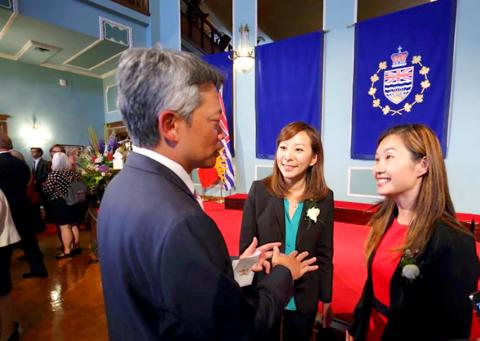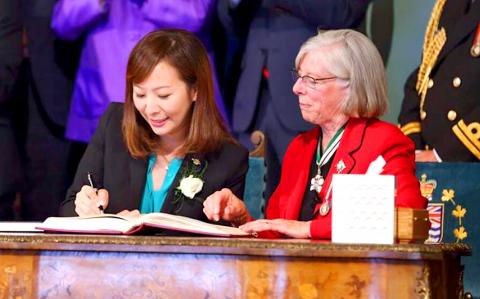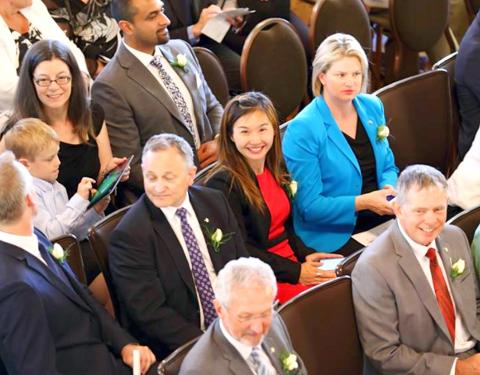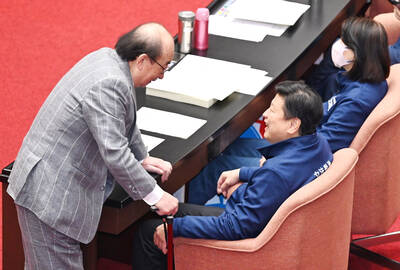Watching her father work long hours as a former Taichung city councilor, the last thing Katrina Chen (陳葦蓁) wanted to be was a politician. It was normal to watch him rush off at odd hours such as 2am to intervene in traffic accidents. Visitors seeking assistance filled his office on the ground floor of their family home and the phone could go off at any hour.
“My dad was in poor health because of all the work campaigning. He did not spend a lot of time with us. Even my mom sacrificed a lot of her time just helping out my dad,” Chen recalls in her sparsely furnished new office a few days before her official swearing-in as member of British Columbia, Canada’s Legislative Assembly and minister of state for child care.
MAKING HISTORY

Photo courtesy of New Democratic Party
Chen and fellow New Democratic Party (NDP) candidate Anne Kang (康安禮) made history on May 9 when both became the first Taiwan-born members of British Columbia’s legislative assembly. It was a moment of pride for the western province’s sizable Taiwanese immigrant communities presiding mainly in Vancouver, Burnaby and Richmond.
The two are serving different Burnaby communities after a contested election that ousted the ruling British Columbia Liberal Party after 16 years in power. NDP leader John Horgan also handed Chen a post in his cabinet as the minister of state for child care and designated Kang as parliamentary secretary for seniors.
Chen’s career path did not come without challenges, starting with being raised in a “high-discipline” family in which her parents physically punished her to instill manners. But as long as she demonstrated good character, they allowed her to explore her interests in literature, music and English. Struggling with the Taiwanese education system and the college entrance exams, a 17-year-old Chen moved to Canada in 2000 so she could focus on subjects she excelled at.

Photo courtesy of New Democratic Party
After graduation, Chen had her heart set on working for nonprofits and zeroed in on gender equality and human rights issues, but she ended up settling for a minimum wage at the grassroots organization ACORN (Association of Community Organizations for Reform Now) rallying around issues like homelessness, community cleanliness, and poverty. Through local Taiwanese connections, Chen became familiar with area politicians and found work as a constituency assistant under both federal and provincial officials before running for office.
CHALLENGES AS WOMEN
Chen and Kang have established a friendship around their roles as young mothers in a demanding role.

Photo courtesy of Anne Kang
Kang recalls the toll of campaigning immediately after giving birth from 2007 to 2008 when she launched her political career as a candidate for Burnaby’s city councilor. In between the first and second municipal elections, she had a second child. Aside from grappling with balancing motherhood and public service, Kang acknowledges that she has encountered double standards based on gender and age.
“Women need to exert extra effort to be heard or to be recognized,” she says. “I felt that I had to be stronger and articulate louder. I had to fight for my chance to speak and my chance to be recognized in a public setting whereas [if it were] your typical Caucasian man walking in, people would say, ‘Oh, welcome councilor.’ That was never given to me as a gift.”
Born in 1977 in Changhua in an agrarian town to preschool teacher mother and a father who was the local church pastor, Kang’s life revolved around the church and Christian teachings that emphasized the value of giving back to the community.

Photo courtesy of Katrina Chen
That didn’t change when her family uprooted to Canada in 1984 where her father continued ministering. As she watched her father counsel people with difficulties fitting in at school or with marriage and immigration problems, their grateful responses left a lasting impression on Kang.
Like Chen, politics was not on Kang’s radar. She was determined to be the a “patient” and “courageous” teacher, not unlike the ones she first encountered as a newcomer to Canada.
But after serving in a variety of organizations such as heading the Taiwanese Heritage Association as a founding director, she realized that policymaking would broaden her capacity.

Photo courtesy of Anne Kang
Having gotten to know the two women, Tom Lee (李志強), director-general of Vancouver’s Taipei Economic and Cultural Office, says that they both demonstrate the passion for public service needed to go far in their careers.
In addition, Lee marveled at the gender balance in the provincial government with an equal number of cabinet posts assigned to men and women. The Taiwanese government, says Lee, could learn from British Columbia’s example.

Photo courtesy of Katrina Chen

Taiwan doesn’t have a lot of railways, but its network has plenty of history. The government-owned entity that last year became the Taiwan Railway Corp (TRC) has been operating trains since 1891. During the 1895-1945 period of Japanese rule, the colonial government made huge investments in rail infrastructure. The northern port city of Keelung was connected to Kaohsiung in the south. New lines appeared in Pingtung, Yilan and the Hualien-Taitung region. Railway enthusiasts exploring Taiwan will find plenty to amuse themselves. Taipei will soon gain its second rail-themed museum. Elsewhere there’s a number of endearing branch lines and rolling-stock collections, some

The Democratic Progressive Party (DPP), Chinese Nationalist Party (KMT), and the country’s other political groups dare not offend religious groups, says Chen Lih-ming (陳立民), founder of the Taiwan Anti-Religion Alliance (台灣反宗教者聯盟). “It’s the same in other democracies, of course, but because political struggles in Taiwan are extraordinarily fierce, you’ll see candidates visiting several temples each day ahead of elections. That adds impetus to religion here,” says the retired college lecturer. In Japan’s most recent election, the Liberal Democratic Party lost many votes because of its ties to the Unification Church (“the Moonies”). Chen contrasts the progress made by anti-religion movements in

Could Taiwan’s democracy be at risk? There is a lot of apocalyptic commentary right now suggesting that this is the case, but it is always a conspiracy by the other guys — our side is firmly on the side of protecting democracy and always has been, unlike them! The situation is nowhere near that bleak — yet. The concern is that the power struggle between the opposition Chinese Nationalist Party (KMT) and their now effectively pan-blue allies the Taiwan People’s Party (TPP) and the ruling Democratic Progressive Party (DPP) intensifies to the point where democratic functions start to break down. Both

This was not supposed to be an election year. The local media is billing it as the “2025 great recall era” (2025大罷免時代) or the “2025 great recall wave” (2025大罷免潮), with many now just shortening it to “great recall.” As of this writing the number of campaigns that have submitted the requisite one percent of eligible voters signatures in legislative districts is 51 — 35 targeting Chinese Nationalist Party (KMT) caucus lawmakers and 16 targeting Democratic Progressive Party (DPP) lawmakers. The pan-green side has more as they started earlier. Many recall campaigns are billing themselves as “Winter Bluebirds” after the “Bluebird Action”